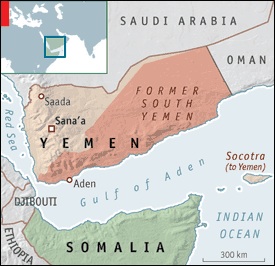The UN offered a glimmer of hope for a peace process 19 months in Yemen’s war last week, offering a peace deal which would see the installation of an interim government made of mostly technocrats, and in which former President Hadi would be a figurehead.
 Hadi, on whose behalf Saudi invaded Yemen, was quick to spurn the deal, insisting it would “reward the putschists” and punish his legitimate government. Hadi was “elected” to a two-year term in office in early 2012, and resigned in 2015, but insists he remains the rightful ruler of the nation.
Hadi, on whose behalf Saudi invaded Yemen, was quick to spurn the deal, insisting it would “reward the putschists” and punish his legitimate government. Hadi was “elected” to a two-year term in office in early 2012, and resigned in 2015, but insists he remains the rightful ruler of the nation.
The Shi’ite Houthis, who had previously ruled out any deal in which Hadi was returned to power, expressed support for the UN plan as a “basis for discussion.” The deal would force Hadi’s main deputy to resign, and give Hadi little to no real power.
Hadi’s rejection, assuming it is upheld by his Saudi backers, means a continuation of the war, and greatly increases the likelihood that Yemen as a unified nation is over. The nation is already in a state of de facto split, and roughly on the same borders as before the 1990 unification.
This may ultimately make more sense for Yemen at any rate, resolving long-standing secessionist ambitions in the south, and leaving Hadi with control of South Yemen, where he is from, and where his limited political support is centered.
The Saudis are unlikely to accept such a solution, however, as it would leave a North Yemen dominated by the Houthis and former president Ali Abdullah Saleh’s political allies with a substantial border with Saudi Arabia after a bloody Saudi-instigated war against them.
While a unity deal in which Hadi gets only token power would allow the Saudis to claim some measure of “victory” in their war, a formal separation would be much harder to spin, and would leave them with a very resentful neighbor on their southern border.


